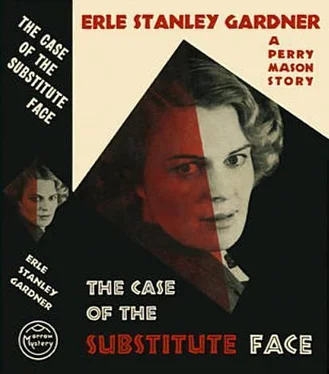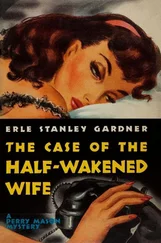“Look here, Perry,” Drake blurted, “has it ever occurred to you that Della might... well, might walk out on you some day?”
Mason’s face darkened. “Damn you, Paul,” he said, “if you—”
“Now, take it easy, Perry,” Drake said, backing away. “After all, she may have met someone on the ship, or—”
Mason moved toward him belligerently. “Spill it,” he said. “Come on, Paul, out with it.”
Drake said, “My men have been busy, Perry. They’ve uncovered a drive-yours elf agency which rented a car to Della shortly before noon. She put up a fifty-dollar deposit and paid a week’s rent in advance. She used the name of D.M. Crenshaw.”
Mason said, “If your men have pulled a boner on this, Paul, I’ll—”
“They haven’t, Perry. They have a photograph of Della. The man who rented her the car identified it absolutely.”
“She was alone?” Mason asked.
“She was alone,” Drake said. “Come on, Perry, let’s go back to the hotel and get a night’s sleep. After all, you’ll have to be in court tomorrow, and by tomorrow you may know what it’s all about.”
Mason stared steadily at the detective for a moment, then turned on his heel. “All right, Paul,” he said, “let’s go.”
Outside the courtroom windows, the sun was sparkling San Francisco’s buildings into clean brilliance. Within the courtroom, daylight waged a losing fight against the gloomy dignity of somber walls of dark mahogany. Electric lights flooded the room with subdued illumination. Not all of the chairs were filled. The thrill-hungry spectators who haunt courtrooms with eager ears, listening for salacious details, could hardly be bothered with a commonplace husband murder.
Perry Mason, lines etched deeply into his countenance, his slightly reddened eyes showing the effects of a sleepless night, said to Judge Sturtevant Romley, “We are ready on behalf of the defendant.”
“Very well,” Judge Romley announced. “Testimony in the preliminary hearing of The People of the State of California versus Anna Moar, also known as Ann Newberry, will be taken at this time pursuant to stipulation of Counsel. Call your first witness, Mr. Prosecutor.”
Donaldson P. Scudder, a slender, anemic individual, with skin which seemed almost transparent, and the precise, academic manner of one who is completely removed from human emotions, said, “Our first witness, if the Court please, will be Frank Remington.”
Judge Romley, recognizing from the Prosecutor’s voice that there was to be nothing spectacular, a mere matter of assembling the legal red tape with which a murder case must be duly tied, sat back in his cushioned chair and glanced appraisingly at the defendant.
Anna Moar, seated behind Perry Mason, her chin held high, her eyes slightly defiant, as though daring the machinery of Justice to do its worst, sat virtually without emotion.
Remington testified that he was manager of the Products Refining Company of Los Angeles; that the corporation had employed a Carl Waker Moar; that Moar was no longer in their employ; that he had failed to report for duty two months ago and the witness had not seen him since.
Scudder, opening his briefcase, said, “I will show you a photograph, Mr. Remington, and ask you if you can identify it.”
“Yes,” the witness said, “this is a photograph of the party to whom I have referred in my testimony — Carl Waker Moar.”
“The person who was employed by the Products Refining Company?”
“Yes.”
“In what capacity?”
“As bookkeeper.”
“We will ask that the photograph be marked for identification,” Scudder said.
“No objection,” Mason said.
“Cross-examine the witness,” the Prosecutor invited.
Mason made a gesture of dismissal. “No questions.”
“The next witness will be Miss Aileen Fell,” the Prosecutor announced.
Aileen fell, in her early thirties, trying to conceal her nervousness beneath a cloak of calm dignity, was sworn and took the witness stand.
“Your name?” Scudder asked.
“Aileen Lenore Fell.”
“Occupation?”
“I’m a schoolteacher.”
“Where were you on Sunday night, the sixth of this month?”
“I was on a ship, traveling from Honolulu to San Francisco.”
“There were other passengers aboard that ship?”
“Oh, yes.”
“I call your attention to the defendant, Mrs. Anna Newberry Moar, and will ask you if she was aboard that ship as a passenger.”
“Yes, sir, she was, but not under the name of Moar — she was traveling under the name of Newberry.”
“And she was accompanied by whom?”
“By a Carl Newberry, her husband, and Belle Newberry, her daughter.”
“Belle Newberry is the young woman sitting on the aisle of the first row of spectators on the left?”
“Yes.”
“And would you know Carl Newberry if you should see him again?”
“Yes, of course.”
“Would you recognize his photograph?”
“I believe so, yes.”
“I hand you a photograph which has been marked for identification as People’s Exhibit A, and ask you if that photograph is of anyone you know.”
She studied the photograph and said with quiet dignity, “It is. That is a photograph of Carl Newberry, who shared the defendant’s stateroom as her husband.”
“Now, what was the state of the weather on the evening of the sixth on that portion of the ocean which was then being traversed by the ship on which you and the gentleman whose photograph you have identified were passengers?”
“The weather,” she said, “was very rough. It was stormy.”
“Can you describe the storm?”
“There was a wind which came, I think, from the southwest. It was blowing very, very hard. Rain was falling in torrents. It was absolutely impossible to stand on the right-hand side of the ship without being soaked by both rain and spray. On the left-hand side of the ship, it was possible to stand in the shelter of the decks, and away from the wind, without getting drenched, although water would run along the decks every time the ship rolled.”
“And the ship was rolling?”
“Yes, quite heavily.”
The deputy district attorney said to the Court, “We will go into greater detail about the weather with the captain of the ship.” Then, turning back to the witness, “Now, Miss Fell, when did you last see the gentleman, Carl Moar, or Carl Newberry, as you knew him?”
“On the evening of the sixth.”
“Can you tell us about what time it was?”
“It was shortly before nine o’clock.”
“Where were you standing?”
“I was standing on the deck below the boat deck, near the stairs.”
“And where did you see Mr. Newberry?”
“Mr. Newberry and his wife...”
“Now, you are referring to the defendant here, when you say ‘his wife’?”
“Yes.”
“Go on.”
“Mr. Newberry, or Mr. Moar, to use his right name, and Mrs. Newberry stepped out on the deck. They stood there for a moment, looking around them. Then they started toward the stairway which led to the boat deck.”
“That was the deck immediately above the one on which you were standing?”
“Yes.”
“Did Mr. and Mrs. Newberry walk past you?”
“Yes.”
“How close were they to you?”
“Not more than a few feet.”
“How were you dressed?”
“I had on a dark beret and a dark raincoat. I was in a sheltered part of the deck directly under the stairs. I was standing in the shadow where they couldn’t see me.”
“Did you hear them say anything?”
“Yes, I heard Mrs. Newberry — that is, the defendant — say something and I heard Mr. Newberry reply in an angry voice. I gathered that Mrs. Newberry wanted him...”
Читать дальше












